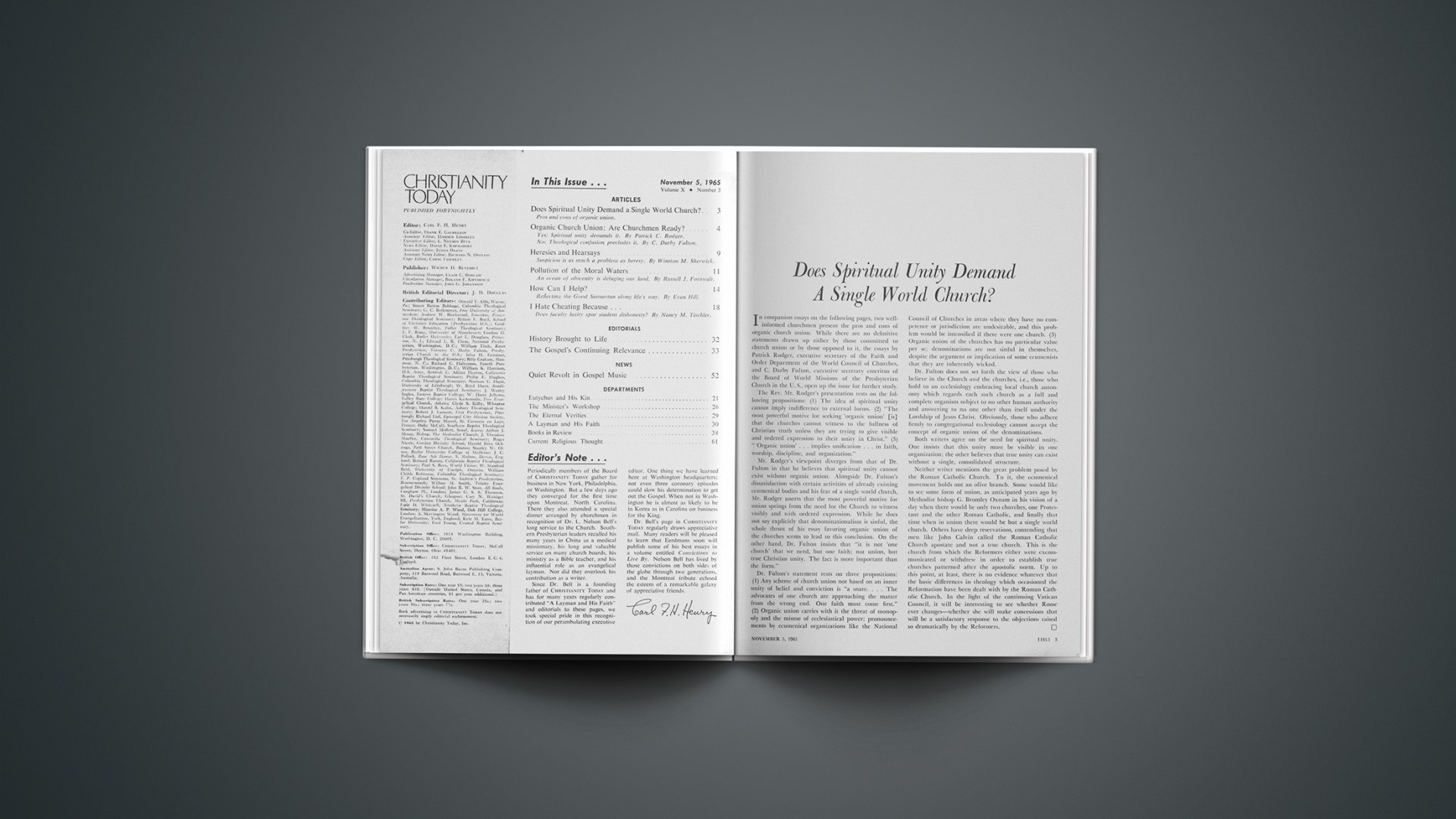In companion essays on the following pages, two well-informed churchmen present the pros and cons of organic church union. While there are no definitive statements drawn up either by those committed to church union or by those opposed to it, the essays by Patrick Rodger, executive secretary of the Faith and Order Department of the World Council of Churches, and C. Darby Fulton, executive secretary emeritus of the Board of World Missions of the Presbyterian Church in the U. S., open up the issue for further study.
The Rev. Mr. Rodger’s presentation rests on the following propositions: (1) The idea of spiritual unity cannot imply indifference to external forms. (2) “The most powerful motive for seeking ‘organic union’ [is] that the churches cannot witness to the fullness of Christian truth unless they are trying to give visible and ordered expression to their unity in Christ.” (3) “ ‘Organic union’ … implies unification … in faith, worship, discipline, and organization.”
Mr. Rodger’s viewpoint diverges from that of Dr. Fulton in that he believes that spiritual unity cannot exist without organic union. Alongside Dr. Fulton’s dissatisfaction with certain activities of already existing ecumenical bodies and his fear of a single world church, Mr. Rodger asserts that the most powerful motive for union springs from the need for the Church to witness visibly and with ordered expression. While he does not say explicitly that denominationalism is sinful, the whole thrust of his essay favoring organic union of the churches seems to lead to this conclusion. On the other hand, Dr. Fulton insists that “it is not ‘one church’ that we need, but one faith; not union, but true Christian unity. The fact is more important than the form.”
Dr. Fulton’s statement rests on three propositions: (1) Any scheme of church union not based on an inner unity of belief and conviction is “a snare.… The advocates of one church are approaching the matter from the wrong end. One faith must come first.” (2) Organic union carries with it the threat of monopoly and the misuse of ecclesiastical power; pronouncements by ecumenical organizations like the National Council of Churches in areas where they have no competence or jurisdiction are undesirable, and this problem would be intensified if there were one church. (3) Organic union of the churches has no particular value per se; denominations are not sinful in themselves, despite the argument or implication of some ecumenists that they are inherently wicked.
Dr. Fulton does not set forth the view of those who believe in the Church and the churches, i.e., those who hold to an ecclesiology embracing local church autonomy which regards each such church as a full and complete organism subject to no other human authority and answering to no one other than itself under the Lordship of Jesus Christ. Obviously, those who adhere firmly to congregational ecclesiology cannot accept the concept of organic union of the denominations.
Both writers agree on the need for spiritual unity. One insists that this unity must be visible in one organization; the other believes that true unity can exist without a single, consolidated structure.
Neither writer mentions the great problem posed by the Roman Catholic Church. To it, the ecumenical movement holds out an olive branch. Some would like to see some form of union, as anticipated years ago by Methodist bishop G. Bromley Oxnam in his vision of a day when there would be only two churches, one Protestant and the other Roman Catholic, and finally that time when in union there would be but a single world church. Others have deep reservations, contending that men like John Calvin called the Roman Catholic Church apostate and not a true church. This is the church from which the Reformers either were excommunicated or withdrew in order to establish true churches patterned after the apostolic norm. Up to this point, at least, there is no evidence whatever that the basic differences in theology which occasioned the Reformation have been dealt with by the Roman Catholic Church. In the light of the continuing Vatican Council, it will be interesting to see whether Rome ever changes—whether she will make concessions that will be a satisfactory response to the objections raised so dramatically by the Reformers.










